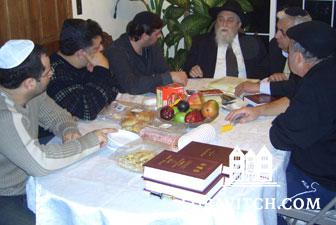A new breed of Russian Jews, far different from the struggling, soup kitchen immigrants who never heard of Shabbat, are tackling Jewish texts and taking serious steps to educate themselves and their children in Judaism.
As Chabad-Lubavitch was born in White Russia, it’s tempting to look at the slick covers of the new published fourth volume of Russian translations of the Lubavitcher Rebbe’s talks “Likutei Sichot” and surmise that the movement has come full circle – from Russia to Russia, with love. But the modest 5000-copy run of the first printing will fan out from its publishers, Friends of Refugees of Eastern Europe (F.R.E.E.), to a new breed of Russian Jews, far different from the struggling, soup kitchen immigrants who never heard of Shabbat.
Some of the new Likutei Sichot volumes may find their way to the weekly study group led by Rabbi Shmuel Notik at Synagogue F.R.E.E., Russian Jewish Communities in Chicago and Suburbs. Ties loosened, suit jackets hanging slack over the backs of their chairs, a group of lawyers, professors, and entrepreneurs from across Chicago and its suburbs settle for their weekly two-hour sessions of high level study of Chasidic philosophy. Not all, indeed not even most, Russian Jews approach Jewish study with such intensity. A general survey of today’s Russian Jew living in North America reveals that their levels of Jewish involvement mirrors American Jews’ – a slice of deeply involved Jews in a pie of proud but tangentially affiliated Jews. Second generation Russian Jews, however, differ from their American counterparts because of the freshness of their immigrant experience: Russian language, culture and community still matter. Chabad centers that satisfy these wants in tandem with their Jewish programming are helping significant numbers of Russian Jews stay in touch with their heritage.
After a long day practicing law in Brooklyn, Vlad Sirota arrives home to gleeful shouts of greeting – all in Russian – from his two daughters, ages 3 and 4. Sirota left Ukraine for New York as a teenager, gulped down English language studies, and secured the American immigrant dream, a professional career. Now that he and wife Inessa are parents, they are working to keep their children’s knowledge of Russian intact and digging into the intellectual meat of Judaism for another reason. “I want my children to have a foundation of knowledge to choose how they will practice Judaism when they get older,” said Vlad. To catch up on the background they do not have, Inessa’s years in a Jewish elementary school notwithstanding, the Sirotas play bible story movies on their home DVD and study with Rabbi David Okunov, associate program director of F.R.E.E. in Brooklyn.
A buzz of chatter rises to a din as 100 young twenty-somethings, lots of young business people and plenty of grad students, all with Russian roots come together for Friday Night Live. Led by Rabbi Levi Notik, the monthly Shabbat dinners bring Russian Jews living in the heart of Chicago in touch with Jewish traditions and with each other. “They are not coming because they were denied Jewish practice in Russia or because they want a free bris. They went to school in America. They speak English and are sophisticated, but the way they eat, drink and socialize is Russian, and when it comes to religion, they feel comfortable among Russians.” A well-dressed man, his hair slicked back, one of the evening’s sponsors, rises to speak. “I go to bars every week, but I never miss Friday Night Live, because I can sit with other Jews. It feels good. It feels Jewish.
The English and Russian versions of Exodus Magazine, published by Jewish Russian Community Centre of Toronto, reach 18,000 Jewish readers each month. Built from a small list of Russian Jews beginning in 1983, the magazine’s articles, advertisements and community news keep Jews informed. The English language version is for the second generation that is able to speak but not read their parents’ mother tongue. “We did their bris, gave them a bar mitzvah and will eventually perform their marriage ceremonies. Just because they can’t read Russian doesn’t mean we should lose touch with them,” said Rabbi Mendel Zaltzman, director of program development. Shalom, a similar publication printed in Chicago, has a readership 14,000 strong. When F.R.E.E. of New York’s Rabbi Okunov was growing up and watching his father and uncle work with Russian immigrants, he assumed the need for Russian-language publications would fade with time. “I thought we would have to stop printing brochures in Russian, but the demand has intensified.” Every Monday, a column by F.R.E.E. of New York writers appears in Novoye Russkaya Slovo, New York’s largest circulation Russian-language newspaper.
Publications. social events and holiday celebrations have helped Chabad centers catering to Russian Jews develop core constituencies. In Chicago, regulars who join in Rabbi Levi and Pessy Notik’s programs are eager to build a synagogue building of their own. In Toronto, the numbers of Russian parents open to Jewish day school education, if it came with a strong secular program and after-school cultural activities like music and chess lessons, drove the creation of Ohr Menachem Academy. F.R.E.E.’s Jewish preschool in Brighton Beach is filled to capacity. Inessa Sirota ranks providing her daughters with a Jewish education even higher than maintaining their Russian cultural ties. “We are severing roots with the country from which we came as we see the fall of its political system and see that it didn’t work,” she said. “When we know that Judaism has lasted for so many years, we realize it is something with higher authority that we want our kids to be a part of.

Be the first to write a comment.